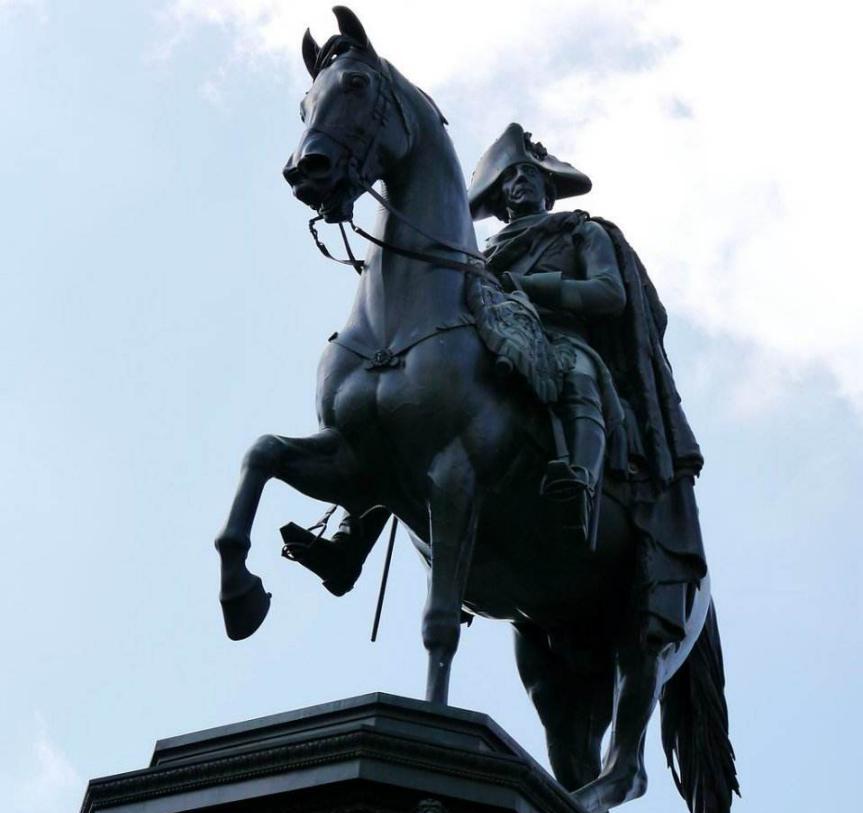【Military Sub-Plane】Author: Red Starry Sky

Frederick the Great is still napoleon in the hearts of Germans
On 24 January 1712, the heir to the House of Hochsoren was born, who at this time was the ruler of the Kingdom of Prussia, headed by Frederick William I, who was called the "King of the Soldiers". Frederick I was pleased to believe that his son would become the excellent king of Frederick II, he strictly controlled his son, even at the expense of using sticks, so Frederick I's childhood was not happy, 18-year-old Frederick II was dissatisfied with the political marriage arranged by the family, planned to flee to England with his companions, but did not run far before he was captured by Frederick I, Frederick II witnessed his friend being executed by his father, and he was also imprisoned by his father. Presumably, psychohistory schools will regard this experience as an important process in the character development of Frederick II, and Frederick II did become mature as a result, but this also created his assertive side, laying the groundwork for Germany to go to extremes in the future.
Frederick the Great's slash tactics are to concentrate forces to break through from one side
Frederick II was a military scientist who continued to work from top to bottom, Gustav II, Durenne, Eugen and others provided theoretical support for him, and his military achievements influenced Napoleon, Moltke and others, indirectly promoting changes in Europe. He created the famous theory of "diagonal battle platoons", the main point of which was to retract one wing of his own combat team and strengthen the other wing ready to attack, so that it would form a local advantage and attack the enemy's flank, and should be applied to the situation of fighting less and more, and to achieve a victory at a decisive point before the enemy's large forces were put into war. In addition, many famous operational principles have been established, such as "protect your flanks and rear, detour the enemy's flanks and rear", and annihilate the enemy's living forces as the main goal.
Prussia was the largest State in Germany and Austria was the second largest, and they were at odds throughout history until Hitler briefly unified Austria
In 1740, at the age of 28, Frederick II ascended the throne, the same year that Grand Duke Maria Theresia of Austria also succeeded to her father's title. There was never a precedent in Germany for a woman to inherit the title of duke, and this became an excuse for Frederick II to go to war. Of course, this was not to maintain the non-existent "European etiquette", Frederick II was purely to compete for the industrial base of Silesia. At the same time he provoked France. The contradictions between Bavaria and Austria set fire to Austria together, and Austria, which could not hold on, naturally accepted it, and finally signed the "Peace of Dresden" Prussia successfully occupied Silesia. Silesia was a well-known center of the textile industry, and in the next decade Silesia contributed almost 1/4 of Prussia's tax revenues, which is not a good place.
Silesia is located between Poland (PL), Prussia (LA) and Austria (BO) and is now part of Poland
Britain and France are feuds and have fought countless wars. Germany and France were united in the Silesian War and naturally disagreed with Britain. After the war, Frederick II began to make peace with Britain and signed the "Non-Aggression Pact", which made France unable to sit still. At this time, Maria Theresia, the Archduke of Austria, who had been hating for ten years, took advantage of France's discontent and pulled Russia together to form an anti-Prussian alliance. It is reasonable to say that Frederick II was surrounded by enemies on three sides at this time and should take the initiative to resolve the contradiction, but Frederick the Great believed that it was better to preemptively attack than to wait for war. At that time, the ratio of Prussia and the Union's army size was 1:3, and the ratio of population was 1:20, but with frederick the great's command ability, prussia finally carried the war that had been fought for seven years, and Frederick the Great became famous, but Prussia or Germany sowed the seeds of crisis.
▲ In the Battle of Rothbard, Frederick the Great defeated the Allied forces of Austria and France with fewer victories and more victories
Prussia developed considerably during frederick the Great's reign, and by the time of his death in 1786, Prussia's territory had expanded 1.6 times and its population had increased from 3 million to 5 million. The rapid rise of Prussia laid the foundation for the unification and revival of Germany in the second half of the 19th century. However, prussia's strength was guaranteed by the military as the first country, which directly affected the political structure of Germany in the future. From the time Frederick made peace with Britain and offended France and Russia, this great war was inevitable. Militarism is the last resort to stimulate the potential of the nation, such as drugs and stimulants, and it must not be tried unless it is a last resort, just like Hitler and others in the future, the military state is cool for a while, losing the crematorium, leaving no room for itself. Frederick the Great's correctness in strengthening the army is indisputable, but the substitution of war for diplomacy sowed the seeds for Germany to trigger a world war in the future.
The territory of Prussia in 1828 already had the ability to unify Germany
For more interesting and interesting military articles, videos, pictures, movies, and games, please pay attention to the "Military and Military Sub-Plane" WeChat public account